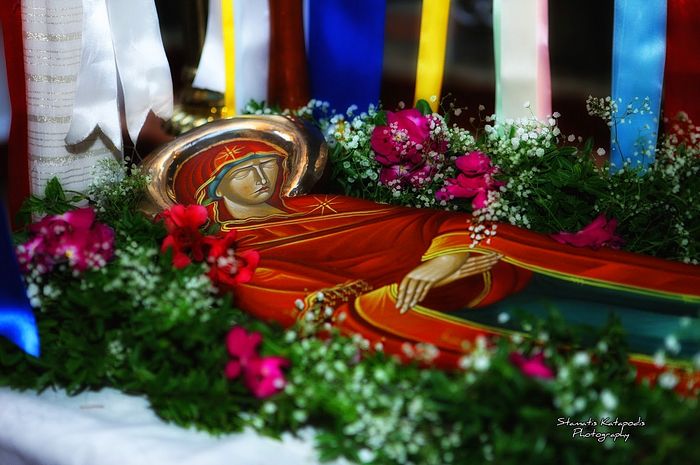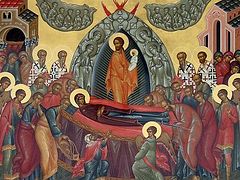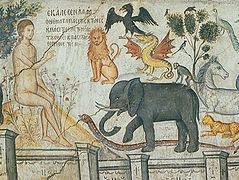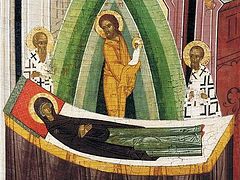I hynm rejoicing in Thy Dormition!
Irmos of the Canon, Ode 1
Brothers, what does it mean that the Church calls the end of Mother of God’s earthly life not death, as we usually refer to this moment in the lives of others, but her Dormition, which is the same as repose, or peaceful sleep; and not only does it not grieve or weep by her coffin, but to the contrary sings joyful, triumphant songs to her departure? That the Most Blessed Mother of the Lord in fact did not die, like ordinary people die, but as if fell asleep for a brief time after her heavy sorrows in life, and that her tomb, which was for her the door to the Heavenly Kingdom, conceals much joy for the Christian. Heavenly incorruption breathes also upon us from this tomb, as from the tomb of the risen Lord; or it would be better to say that this tomb immutably promises to us also immortality of soul and incorruption of body, eradicating the fear of death in us.
Glory to the Conqueror of death, the Lord Jesus! Before His coming, death was very frightening for man because it snatched its prize irreversibly, and there were no means to escape it—for sin, by which death was so strong, was pouring out like a tidal flood and no one was strong enough to stop this flood. Meanwhile, everyone knew that people who were snatched away by death were kept like captives in that place where they usually went after death. It’s true that there were two or three examples of men who did not experience death at all; one of them through prayers and tears was granted postponement from it when it was already completely upon him at the hands of a murderer, and death was not permitted to touch him for another fifteen years. But what are these two or three examples in comparison with the millions of people who died?! Only a drop in the ocean. Especially since the latter case was not entirely consoling for people, because King Hezekiah could not totally escape death, but only obtained through prayer a postponement of it, and the first two—Enoch and Elias—were considered impossible to emulate for the holiness of their lives, for which they were taken up into heaven.
What do we see now, after the Lord’s appearance in our flesh and after His victory over sin and death? The whole horror of death has disappeared; it has become like a peaceful sleep, after which will come the joyful morning of the general resurrection. To the measure of which each of us conquers the sin that still lives in us—and now we have been given all the means we need to conquer it (cf. 2 Pet. 1:3)—the fear of death also disappears, so that the triumphant conquerors of sin joyfully greet their deathbed and do not die, but verily fall tranquilly asleep. “Today,” says St. John Chrysostom, “The Lord has shattered the gates of hell and destroyed the very person of death. But why do I say, the person of death? Even the very name of death has changed, for it is now called not death, but repose and sleep.”
We see the most obvious example of the victory over death in the Most Pure Mother of the Lord. She reclined into the tomb for only a brief rest of the flesh. We say “brief” because according to the testimony of tradition, on the third day after her death, her most pure body was not found in the tomb—it was resurrected and taken to heaven, where it began to delight in the blessedness of heaven along with her soul. After the Mother of God we see the apostles and martyrs who greeted death with joy like the greatest friend, who in exchange for the fleeting good things of this present world, or in exchange for its calamities and sorrows gives them eternal joy in the Kingdom of Heaven. After them we see all the saints, who looked at death with the same joy, seeing in it the end of their earthly labors and the beginning of heavenly glory. The Holy Church tries to settle also into us the same fearlessness of death, exhorting us to cast out the fear of it through the constant uprooting of sins in ourselves, and it calls our dead ones none other than the “reposed”—that is, as if fallen asleep, because now we no longer doubt in the deathless life on the future age, and our right to it is so sure that we cannot or should not look at death in any other way than as sleep. Glory to the endless blessings of God! Before, we sobbed long and inconsolably over our dead and were even allowed to shed tears right over their corpses. My son, said the God-enlightened wise one, shed tears over the dead, and begin to lament… And make mourning for him according to his merit (Sirach 38:1–18). And now instead of weeping over the grave we sing the hymn, Alleluia, or Praise God, giving praise for His divine wisdom and goodness, which have made death a translation into immortality.
Brothers! You have seen the calling of a partaker of heaven in the icon of the all-honorable and glorious Dormition of the Mother of God—how she peacefully reposes. What tranquility and reflection of heavenly joy is in her countenance! It is verily sleep, a brief passing from earth to heaven. Let us also learn by this, and through this assiduity, virtue, and disregard for sinful tendencies, let us make death our peaceful sleep. As long as death reigns in us, death will also be terrible for us, because truly the death of sinners is evil (Ps. 33:22). Sin is the cause of death. For, it is said, the wages of sin is death (Rom. 6:23).
Let us according to our strength conquer sin in ourselves, as the cause of death. Only at first it is very hard to conquer it, but then it will become easy and sweet, because according to the measure of the increase of the suffering brought on by our struggle with sin, so our consolation also aboundeth by Christ (2 Cor. 1:5); and the Lord Who said that His burden is easy and His yoke is light (Matt. 11:30) will surely also make the labor of ascetics easy and life-creating. Furthermore, we value more greatly what is achieved laboriously, and we are more greatly delighted by it. We are created for labors, and not for luxury and inactivity. Yes, heavenly glory, which has no end, is without a doubt worth the labors, according to our strength, of our whole life. This incomparable blessedness, this kingdom of glory is not given without a cost. The Kingdom of Heaven, it is said, suffereth violence, that is, it is obtained by great effort, and the violent take it by force (Matt. 11:12).
Isn’t the reason we are so lazy about conquering passions and evil inclinations in ourselves that we have such weak faith in the life of the future age? But this future age is just as sure as our present life. Won’t the One Who has given us the beginning of life here on earth give us the full and perfect life in heaven?! Yes, this inevitably must be, and it is harder for it not to be than to be. And we are assured of it by God’s unlying word. Marvel not at this: for the hour is coming, it says, in the which all that are in the graves shall hear his voice, and shall come forth; they that have done good, unto the resurrection of life; and they that have done evil, unto the resurrection of damnation (Jn. 5:28–29).
Brothers! Eternal life beyond the grave is not subject to any doubt. But neither can there be even the slightest doubt that it can be ambiguous: For the righteous it is blessed, but for hardened sinners it is torment. There is a limit to death, a borderline between the present and future life, and we do not know whether it is far or near to us. Let us be ever ready to step over this threatening borderline between two lives. Amen.




